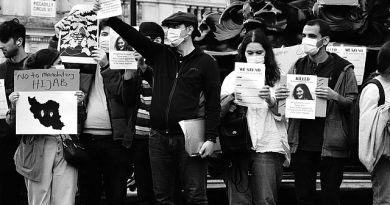What’s Wrong with Brazil’s Olympics?
By Leah Cerilli
Associate Editor
For months before the opening of the 2016 Summer Olympics in Rio de Janeiro on August 5, Brazil has been subjected to criticism over its readiness and capability to host the Games. More than any other sporting event, the Olympics are seen as an opportunity for the host country to make a global impression and showcase its political and economic conditions, and Brazil has tried to show the world that it is a stable democracy despite a stream of political, economic, and social concerns.

The impeachment of President Dilma Rousseff shed a negative light on the host country in April, merely four months before the Games. Rousseff is accused of illegally manipulating finances to hide a growing public deficit ahead of her 2014 re-election, an allegation that Rousseff denies.
The pressing task for the interim president, Michel Temer, is to stabilize Brazil after months of political turmoil. A seamlessly executed Olympics could take the spotlight off Rousseff’s trial and show the world that both Brazil and Temer are politically and economically capable.
According to CNN, the International Olympic Committee monitored Rousseff’s situation and has stated that the Games would not be significantly affected by the trial this late in the organizing stage, as all major details of the Games had already been planned. Similarly, Rousseff has said that sporting venues, media, and security infrastructure are all on schedule, adding that she is “pleased with government progress.”
Not many others share Rousseff’s satisfaction with the government’s preparation for the Games. There are concerns that corners were cut and the infrastructure is shrouded in corruption.

According to The Associated Press, a bike path heralded as “one of the most successful Olympic legacy projects” collapsed into the ocean in April, killing two people and injuring at least two more. Concremat, the company that built the bike path, is owned by the family of Rio’s municipal public works secretary, Antonio Paulo Viegas Figueira de Mello. A spokesperson for Concremat declined to comment on the family connection and whether the company was involved in building other Olympic projects.
Suspicions of corruption were also brought to light by the arrest of Marcelo Odebrecht, according to The Washington Post and The New York Times. Odebrecht, the chief executive of Latin America’s largest engineering and construction conglomerate, was arrested on charges of bribery, money laundering, and organized crime. Odebrecht’s company, founded by his grandfather, was involved in construction for the Games.
Dr. Catherine Tinker, a professor at the School of Diplomacy and president of the Tinker Institute on International Law and Organizations, said that Odebrecht’s arrest is a positive step for Brazil’s reputation and future as a just and fair democracy. She called Odebrecht’s conviction to 19 years in prison “extraordinary,” because “the great families of Brazil were untouchable in the past.”
“Even when under investigation, there was talk that he would get charges dropped or take a plea bargain, but he is in jail now,” she said.
Brazil’s economic downturn was also an unpleasant surprise for the International Olympic Committee. According to NPR, the Summer Olympics were awarded to Brazil seven years ago when its economy was rising and politics were stable; today, inflation and unemployment are soaring. Brazilians have been critical of the bid because it is likely that the Games will put their country in further debt. As with most Olympic host countries, it is expected that Rio will not make a profit from hosting the Games.
“While some landlords, hoteliers, restaurateurs and individual vendors will profit handsomely, overall the economy may take a hit as governments cut back on spending for hospitals and schools to pay the bills for the new Olympic golf course and repairs to the Maracana stadium,” Dr. Tinker said.
Both international and domestic ticket sales have been unusually weak. In June, only 50 percent of international tickets available had been sold with the Games about two months away. Revenues from ticket sales will be enough to pay back private investors, but not the Brazilian government for roughly $4.5 billion of public money spent.
It was difficult to expect high domestic ticket sales, considering low income among Brazilians and a cultural tendency to buy at the last minute. But it is also expected that there will be fewer than usual international tourists attending the Games due to concerns about instability, violence, and the Zika virus.

According to the CBC, Brazil has one of the world’s highest murder rates, and most murders and violent crimes occur in slums called favelas. In 2008, a special pacifying police force was created: non-combative officers who are able to enter favelas typically considered dangerous for regular police due to violent clashes between them and faveleiros. Overall, the pacifying forces have been successful in establishing a permanent presence and relationship within volatile communities — homicide and violent crime rates were significantly lower than prior to the force’s creation.
But the trend has changed drastically over the past six months: Murders, assaults, and property crimes are on the rise again. This is largely due to security budget cuts and the rise of younger criminals who are not afraid of Brazil’s lenient juvenile justice system.
According to Forbes, most of these crimes are concentrated in Brazil’s northern region, far from Rio and its Olympic sites. Rio de Janeiro is ranked safer than several cities in the United States, such as St. Louis, MO, and Detroit, MI. American fans attending the Games have been told to take normal precautions when traveling abroad, specifically to large urban areas.
“Police violence against faveleiros remains a major problem, as does cooperation between organized crime networks and the police, but Olympics fans are unlikely to be affected,” Dr. Goldfrank said.
Dr. Tinker agreed: “With normal urban awareness and precautions for safety, most people will have a wonderful time.”
But that may not be enough to reassure visitors who are wary of the Zika virus. According to Healthline, there have been over 90,000 cases of the Zika virus in Brazil since February, with 35,000 recorded in the southeast region, where the Olympics are being held. Without complications, the virus is transmitted by mosquitos and presents as flu-like symptoms for about a week. The concerns stem from lifelong brain defects caused by microcephaly that can occur in children born to women infected by the virus during pregnancy. Thus far, there have been 4,900 cases of microcephaly related to the virus in Brazil. The virus can also be sexually transmitted by men for an unknown period after exposure.
The World Health Organization, the Centers for Disease Control and Prevention, the International Olympic Committee and the U.S. Olympic Committee have all said the Games should continue despite calls to move or delay it over the Zika virus, issuing health and safety guidelines related to the virus. Since the Olympics are taking place in Brazil’s winter season and near the coast, mosquito activity is expected to be significantly lower, thus lessening the risk of infection.
Beyond the Games, Brazil’s main fiscal problem is that the federal government’s primary expenses are increasing while primary revenues are declining, spawning high inflation and a rising deficit, according to the International Business Times. Although there is small hope for economic growth in 2017 after Brazil’s economy hit rock bottom this year, Brazil remains attractive to some foreign investors, who see it as a large, diversified economy with bargain prices.
Dr. Tinker expressed optimism about the economy: “Brazil still has enormous reserves of minerals and oil, agribusiness has spread across many of the southern states with potential ahead, the country is rich in water resources except in certain drought-prone areas in the northeast, and the people have a spirit that will bring prosperity back again as it has in the past, although it may take longer than a few years.”



Brazil may be facing low Olympic ticket sales, but no shortage of #RioProblems. #Rio2016 https://t.co/cPseiGDD5m https://t.co/AgbnHcoREz